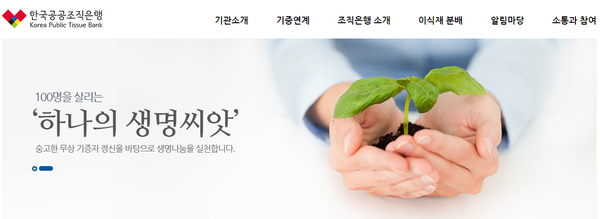Korea Public Tissue Bank (KPTB), a public institution under the Ministry of Health and Welfare, which produces transplant materials by receiving donated human tissues, was caught red-handed for selling off donated tissue at a discount price, a lawmaker said.

According to the special audit result report submitted by the KPTB to Rep. Kang Sun-woo of the main opposition Democratic Party of Korea (DPK), a former KPTB manager arbitrarily signed a contract to sell off donated tissue at a discounted price to a local biocompany in November 2020.
Under the accord, the biocompany decided to purchase human tissue graft materials such as the fascia, joints, blood vessels, and bones that were valued at 366 million won ($255,497) for 230 million won, about a 40 percent discount.
The biocompany that purchased the human tissue made an advance deposit of 150 million won on Nov. 25, 2020, right after the contract was concluded, and the KPTB handed over the transplant material on Dec. 22 of the same year.
The biocompany paid the remaining 80 million won after receiving the transplant material on Dec. 24.
According to Rep. Kang, the unusual discount and fast conclusion of the contract were due to the lack of the budget at KPTB. The agency at the time was not able to pay their employees' salaries, the lawmaker said.
As a result of the audit, conducted on Nov. 24, 2020, the bank account balance of the KPTB was 25.79 million won.
During the audit process, the former manager who sold off the human tissue at a discounted price, said that he was entrusted with the decision-making authority by the president of KPTB to promote this contract.
However, the employee made discount conditions arbitrarily and he did not report the process to the Health Ministry or the KPTB.
Despite such wrongdoing, no disciplinary action was taken as the formere manager had already retired.
Instead, the KPTB concluded the case by preparing internal guidelines related to the distribution of intermediate goods within the institution, calculating and adjusting the distribution, and establishing standard contract procedures.
Rep. Kang noted that this was only one of the recent blunders by the KPTB.
In September 2018, the KPTB confirmed that some bone powder graft material (250g) worth 2.44 million won, used for bone loss due to trauma caused by a traffic accident or artificial joint surgery, had disappeared.
While an initial investigation revealed that a team leader within the KPTB distributed the graft material free of charge to a specific company, the recipient firm and the team leader retracted their statement during a follow-up special audit conducted by the Ministry of Food and Drug Safety.
The KPTB has since reported the disappearance of the graft material to the police in February, but so far, the police have been unable to verify the whereabouts of the graft material.
The tissue bank is also facing legal issues regarding six employees raising their salaries arbitrarily without internal approval.
"There are a number of insider reports that the tyranny and wrongdoing of middle-level executives at KPTB are continuing," Rep. Kang said. "Stricter measures should be taken against the misconduct of some employees who use precious human tissue donated by Koreans as a means of pursuing their own personal interests."

